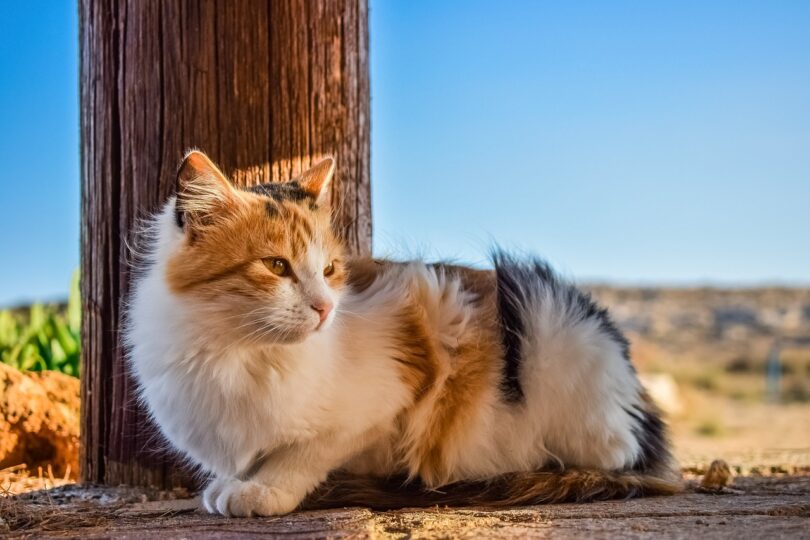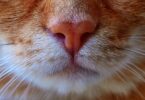Does your cat have bad breath? As well as being unpleasant, this phenomenon can be a sign of a health problem. It is therefore not to be taken lightly. In order to remedy this, it is necessary to understand the origin of this bad breath. Once it has been treated, you can develop good habits to prevent future problems.
Why does my cat have bad breath?
The cat’s mouth is a complex environment, which serves as an interface between the inside of the body and the outside world. It is inhabited by bacteria, some of which are naturally present and help digestion, while others are provided by food.
These bacteria can cause inflammation and infection in the oral cavity. It is the most common cause of bad breath in cats, also called halitosis. In addition, the composition of saliva is very dependent on the health of the animal.
An imbalance in the metabolism or the waste elimination process can drastically change this composition, and cause bad breath. In other cases, the origin of the unpleasant odor is in the cat’s digestive tract.
What are the main causes of bad breath in cats?
A cat’s bad breath can have many causes. Here we will detail the most common. It helps to be able to recognize the different symptoms. This will help you determine if your cat’s condition requires, for example, to see an emergency veterinarian.
1) Oral problems
Often your cat’s bad breath is caused by an oral hygiene problem. When the cat eats, food residues are deposited on the surface of the teeth, which attracts bacteria: this is dental plaque.
On contact with saliva, dental plaque mineralizes, giving rise to tartar. This appears like an extremely hard yellowish deposit on the surface of the teeth. The presence of dental plaque and tartar can lead to infections, and thus be the cause of halitosis in your cat.
Oral disease can cause inflammation of the gums, the lining of the inside, and the back of the mouth. These areas are then red, swollen, causing pain. There may be excess salivation and spontaneous bleeding.
The first cause is the presence of tartar, but then there can be infected with certain FELV, FIV, Calicivirus, and individual immune sensitivity which accentuate/worsen the signs. It is very important to monitor the condition of your cat’s mouth very regularly. If the tartar is allowed to settle, irreversible lesions set in lesions from tooth resorption and periodontitis. The tooth is damaged and causes pain, it must then be extracted.
Some cats with individual sensitivity, sometimes carrying the viruses mentioned above, have chronic gingivitis and stomatitis which may require a total tooth extraction in order to improve their comfort.
Cats with very short noses, like Persians, are more prone to oral problems. This is because their teeth tend to overlap, which promotes the appearance of tartar. Periodontal infections are also more common in cats with viral infections such as FIV (feline AIDS) or FeLV (feline leukemia).
2) Difficult digestion
Just like in humans, digestive problems can cause bad breath in cats. This is especially the case if the digestive disorder causes frequent vomiting. The main reasons are often: an inadequate diet, a disturbance of the intestinal flora, or the presence of parasites.
3) licking
Even if this cause seems obvious, it is nevertheless important to mention it. The cat likes to be clean from the tip of the ear to the tip of the tail, and that also includes its anus… When your cat has just cleaned this part of his body, it is normal for you to notice bad breath. This will quickly disappear.
4) Uremia
Uremia is a disease that occurs due to kidney failure. The kidneys can no longer eliminate urea, which is a waste product caused by the breakdown of proteins during digestion. Urea then accumulates in the blood, of which it is a constituent.
Too much urea concentration in the blood causes a strong ammonia odor. This is a sign that kidney failure is already well established. This is a veterinary emergency. In fact, a cat’s state of health deteriorates very quickly in the absence of appropriate treatment.
5) Diabetic ketoacidosis
Ketoacidosis is a complication of diabetes and manifests itself as an excess of ketone bodies in the body. This reaction causes a large amount of acetone to form, which is released into the blood.
This causes various symptoms: vomiting, loss of appetite, dehydration, drowsiness, rapid breathing … The cat’s breath also takes on a very typical smell of acetone. It is then extremely urgent to consult a veterinarian, in order to avoid the rapid death of the cat.
How to treat bad breath in cats?
Once the cause of your cat’s bad breath has been identified, it can be treated. The management is obviously very dependent on the nature of the problem.
In the case of diabetes or uremia, these diseases will of course have to be treated. If halitosis is caused by oral problems, there are several treatments available, depending on the exact nature of the problem and how severe it is.
Even with gingivitis, it is imperative to act and check that the situation does not worsen. Indeed, an uncontrolled infection can cause the passage of bacteria in the blood and the digestive tract, and damage certain organs.
1) Anti-tartar croquettes and sweets
In order to fight against the appearance of tartar, the veterinarian can recommend specially formulated kibbles. These are particularly abrasive, and therefore prevent the formation of dental plaque, and its mineralization that causes tartar. Even though these kibbles are over the counter, always consult your veterinarian before giving them to your cat. Indeed, they can worsen certain situations, especially if your little companion suffers from periodontitis.
Other natural treats and tartar supplements may also be recommended by your healthcare professional, such as Matatabi dental toys. These natural chew sticks help maintain good oral hygiene and promote good health for your pet.
2) Anti-tartar care
On veterinary advice, you can also choose anti-tartar care, which will improve your feline’s dental hygiene and gradually remove tartar plaques. Pet toothbrushes or toothpaste spray and oral gels can also be recommended, getting the cat used to it at a very young age.
3) Descaling
If your cat’s bad breath is due to oral disease, your veterinarian will often need a scaling. This will limit the proliferation of bacteria, thus greatly reducing the risk of gingivitis or periodontitis.
In order to be able to perform this operation, the veterinarian is forced to put the cat under general anesthesia. Descaling is therefore impossible for animals that are too old or sick. In addition, it is a rather expensive intervention, the price of which is around 100 euros.







